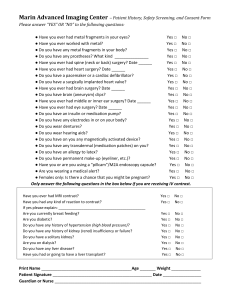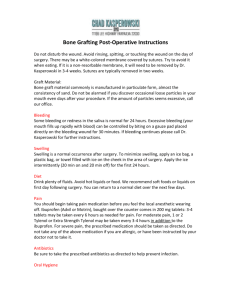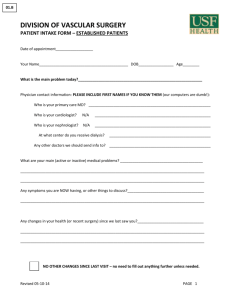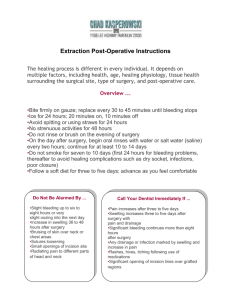Craig M - ProSites.com
advertisement
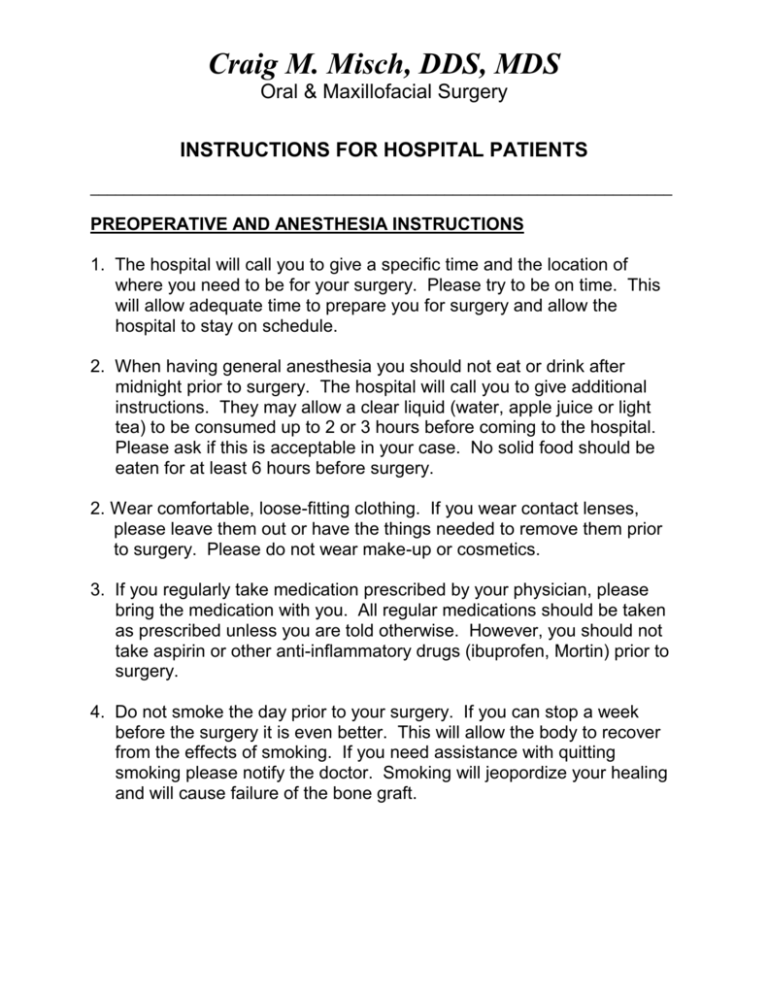
Craig M. Misch, DDS, MDS Oral & Maxillofacial Surgery INSTRUCTIONS FOR HOSPITAL PATIENTS _____________________________________________________________________ PREOPERATIVE AND ANESTHESIA INSTRUCTIONS 1. The hospital will call you to give a specific time and the location of where you need to be for your surgery. Please try to be on time. This will allow adequate time to prepare you for surgery and allow the hospital to stay on schedule. 2. When having general anesthesia you should not eat or drink after midnight prior to surgery. The hospital will call you to give additional instructions. They may allow a clear liquid (water, apple juice or light tea) to be consumed up to 2 or 3 hours before coming to the hospital. Please ask if this is acceptable in your case. No solid food should be eaten for at least 6 hours before surgery. 2. Wear comfortable, loose-fitting clothing. If you wear contact lenses, please leave them out or have the things needed to remove them prior to surgery. Please do not wear make-up or cosmetics. 3. If you regularly take medication prescribed by your physician, please bring the medication with you. All regular medications should be taken as prescribed unless you are told otherwise. However, you should not take aspirin or other anti-inflammatory drugs (ibuprofen, Mortin) prior to surgery. 4. Do not smoke the day prior to your surgery. If you can stop a week before the surgery it is even better. This will allow the body to recover from the effects of smoking. If you need assistance with quitting smoking please notify the doctor. Smoking will jeopordize your healing and will cause failure of the bone graft. MEDICATIONS Take all of the medications given or prescribed for you as directed. They have been given to you for very important reasons. The only type of medicine that you do not have to take all of is the pain medicine. Take all the medications with food unless otherwise stated. Have the prescriptions filled as soon as possible. Pain medications (Vicodin, Percocet, Advil, Motrin, Tylenol) Please take the prescribed medication (Percocet, Vicodin) as directed. It is easier to keep you pain free, than to get you out of pain once it occurs. If you still have moderate to severe pain after taking the prescription then call the doctor. Do not drive or operate machinery if you are taking narcotic pain medication (Percocet, Vicodin). If you develop a rash or have difficulty in breathing, page the doctor (888) 650-1755. You may develop constipation from the narcotic medication. You may take an over the counter laxative if necessary. If you are only having minimal discomfort, you many switch to over the counter pain relievers (Tylenol, Advil). Avoid aspirin as it may slow healing. Antibiotics (Penicillin, Amoxicillin, Keflex, Cleocin - clindamycin) You will be prescribed an antibiotic to help prevent infection. To be most effective, please take the medication as prescribed. It is important to take all of the antibiotic to completion. **Failure to take this medication as directed will increase your risk of infection. If you develop a fever, drainage and/or increased swelling after the surgery, please contact the doctor. If an allergy occurs (hives, itching, rash), discontinue the medication and contact the doctor. If you develop severe or persistent diarrhea please notify the doctor. Anti-inflammatory (Decadron) You may be prescribed an anti-inflammatory medication to help minimize swelling after surgery. Unless you are told otherwise, you should take this medication in the morning. GENERAL INSTRUCTIONS 1. Increase your fluid intake following surgery and maintain a soft diet. 2. Do not wear your dentures unless otherwise told by your doctor. Pressure from the denture can cause the sutures to loosen and disturb the bone graft. 3. Do not pull on your lip to examine the surgical site. The incision may open which can jeopardize the graft and delay healing. 4. Do not smoke for at least two weeks after surgery. Smoking will delay healing and cause bone graft failure. Use the nicotine patch as directed if needed. You may also receive a prescription for Zyban (bupropion) to help prevent smoking. Ask the doctor if you need these anti-smoking medications or other techniques to help you quit smoking. 5. Avoid rinsing vigorously or spitting until the sutures are removed. 6. Do not brush or floss your teeth after surgery unless directed otherwise by the doctor. You may be prescribed an antiseptic mouth rinse (chlorhexidine - Peridex) after surgery. Rinse gently for one full minute twice a day (no more than twice a day). Gentle rinsing with warm salt water after meals will help to clean the mouth. To make the salt water rinse, mix one teaspoon of salt with half a glass of very warm tap water. 7. Please limit your physical activity following surgery. You should be able to resume light activity in a day or two. Sinus Bone Graft or Sinus Lift Surgery (Upper Jaw) 1. Avoid rinsing vigorously (ballooning your cheeks) or spitting until the sutures are removed. 2. Do not blow your nose and sneeze with your mouth open if you have to. You may experience some bleeding from the nose. If you feel congested, use an over the counter nasal spray such as Afrin and decongestants such as Sudafed tablets. Do not use the nasal spray for more than 3 days. Hip Graft Surgery 1. While you are lying in bed after surgery you should stretch, bend and move your feet and legs to improve your circulation. You should begin walking with assistance the day after surgery unless told otherwise by the doctor. You will require assistance to get out of bed. Walk only short distances and support your weight against another person or object. If you need crutches, a cane or walker please let the doctor know. You can rent these walking aids at most pharmacies. You may require physical therapy to assist your recovery. 2. Apply antibiotic ointment (Bacitracin) to the surgical incision over the hip every day. You should change the dressing over the hip daily and keep the area clean. However, keep the incision area dry and do not take a bath or swim until directed by the doctor (usually a week after the sutures or staples are removed). After the sutures/staples are removed you may apply a lotion to keep the skin moist such as coco butter. 3. You may notice bleeding from the hip incision for a few days. The gauze dressing should collect the blood. Bruising around the area is normal. If the bleeding is excessive or if the incision drains excess fluid call the doctor for instructions. 4. You should expect soreness when sitting up, coughing or straining your stomach muscles. Straining during bowel movements will also be uncomfortable. You may also experience constipation from the narcotic pain medication. You can use an over the counter laxative or prune juice. It will also be sore to lift and turn the leg on the operated side. Be patient. Each day the area should feel better. It often takes four to six weeks to regain strength and mobility. Although it is important that you rehabilitate yourself, the increase in activity should be gradual. Avoid strenuous exercise or heavy lifting for several weeks. 5. You should avoid driving until you are easily able to move your foot between the gas and brake (or clutch) pedal and apply force for urgent breaking of the vehicle. If the right hip was used it may be many weeks. 6. You may leave the hospital with an anesthetic catheter in your hip area to relieve the hip pain. The plastic catheter must be covered with the screw-on protective cap at all times. The catheter is secured with clear adhesive tape. Do not remove the tape and keep the area dry. If the catheter falls out then save it and bring it to the next appointment. Bleeding Slight bleeding for a number of hours following surgery is not unusual. Your saliva may be tinged with blood for up to 48 hours. If heavy bleeding is still present after surgery, moisten a wash cloth or wrap a tea bag in moist gauze and place it over the area applying gentle pressure for fifteen minutes. Repeat this if necessary. Holding small amounts of ice water in your mouth will usually stop any slight oozing. If there is excessive or continual bleeding after surgery, call the doctor for instructions. We would prefer that you avoid the graft area until the sutures are removed. Pain You will probably have pain in the area the day of and the day following surgery and possibly longer. Take your prescribed pain medication after surgery even if you do not feel pain. It is easier to prevent pain than decrease it. Limit your activity the first few days after surgery. Trying to do too much too fast increases the swelling which increases your pain. Swelling To minimize swelling, a cold pack should be intermittently applied to the face next to the operated area (use crushed ice in zip-loc bags wrapped in a thin cloth or paper towel). Keep the cold pack on for 10 minutes, then off for 10 minutes. Repeat this sequence for 2 to 4 hours the day of surgery. Bed rest after surgery with the head elevated by a pillow is also recommended. By limiting your activity after surgery, you will significantly limit the degree of swelling. Swelling usually peaks three days after surgery and may persist for one to two weeks. There may be numbness associated with the swelling. Fair skinned patients or those who bruise easily may anticipate some discoloration of the skin over the area. If the swelling is severe and/or you feel feverish as well, please call. It may be helpful to apply vaseline to your lips to keep them moist. Instructions for diet following your surgery Drink plenty of cool fluids after surgery such as water and fruit juice. Avoid carbonated beverages (soda) and hot foods or drinks for at least two days. A soft non-chewing diet is recommended for two weeks after surgery to allow the gum tissue to heal over the bone graft. It is also advisable to avoid acidic foods such as tomatoes, peppers, or citrus fruits and highly seasoned foods that may irritate the mouth. You may resume eating these foods in a few weeks after the mouth sutures are removed. After the sutures are removed from your mouth it is still important not to disturb the bone graft so that it may fuse to your jawbone. Do not eat with your dentures or removable teeth. We realize that you may occasionally be in social situations that you will want to wear your dentures. If you occasionally need to eat a meal with the denture in place, choose a diet that is soft and does not require much chewing. If you need to use your denture for eating more that once a week please discuss this with Dr. Misch. Patients that maintain a good diet of soft foods generally feel better, have less discomfort, and heal better. A nutritious diet throughout the healing period is important to your comfort, temperament and healing. Chop food in smaller pieces or use a blender to puree. Also avoid foods that may cause trauma to the gums such as popcorn, chips, nuts or shells. A daily multiple vitamin and daily calcium supplements (ie. Citrical) are also recommended. Food supplements such as Metrecal, Nutrament, Ensure, Enrich, Sego, Instant Breakfast, etc. are an excellent source of nutrition. Breakfast Apple juice, water, milk, coffee, tea. Yogurt, cooked cereals such as oatmeal or cream of wheat. Scrambled eggs, cottage cheese, milktoast, applesauce. Lunch and Dinner Home cooked broth, bouillon, soups. Ground beef, baked or broiled fish, broiled or stewed chicken (finely chopped). Macaroni and cheese, scrambled eggs, bread softened with gravy. Baked or mashed potatoes. Asparagus, peas, carrots, lima beans, string beans (all mashed). Cottage cheese, canned bartlett pears. Jell-O, puddings, pound cake. Milkshakes and ice cream. NOTIFY THE DOCTOR IF ANY OF THE FOLLOWING OCCUR: 1. If pain or swelling increases after 3 days. It should be decreasing. 2. If the sutures become loose or dislodged before 3 days. 3. If you have any signs which may indicate a drug reaction or allergy such as itching, hives, rash or difficulty breathing. 4. Your body temperature becomes higher than 100 degrees F taken orally. 5. Numbness persists for more than three days after surgery. 6. Pain in your jaws or hip is not relieved by the prescribed pain medication. 7. If you have any difficulty in swallowing or breathing. 8. If you develop nausea and cannot tolerate fluids by mouth. 9. If the gauze dressing over your hip cannot absorb a significant amount of fluid or blood draining from the hip area. 10. If you are having difficulty not smoking after surgery. 11. If you are having difficulty voiding your urine or if you are constipated and have not had a bowel movement after taking a laxative. Telephone Numbers Dr. Misch’s Office (941) 957-6444 Dr. Misch’s cell phone (emergency use only) (941) 587-7582 Doctor’s E-mail Address - misch@bonegraft.com Sarasota Memorial Hospital (941) 917-9000 Doctor’s Hospital of Sarasota (941) 342-1100



